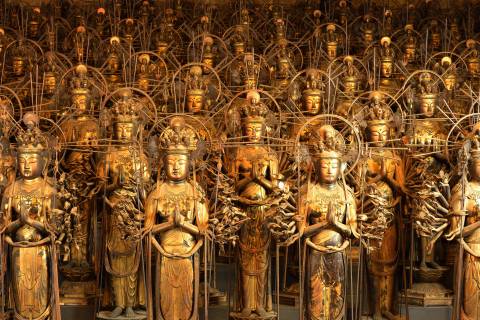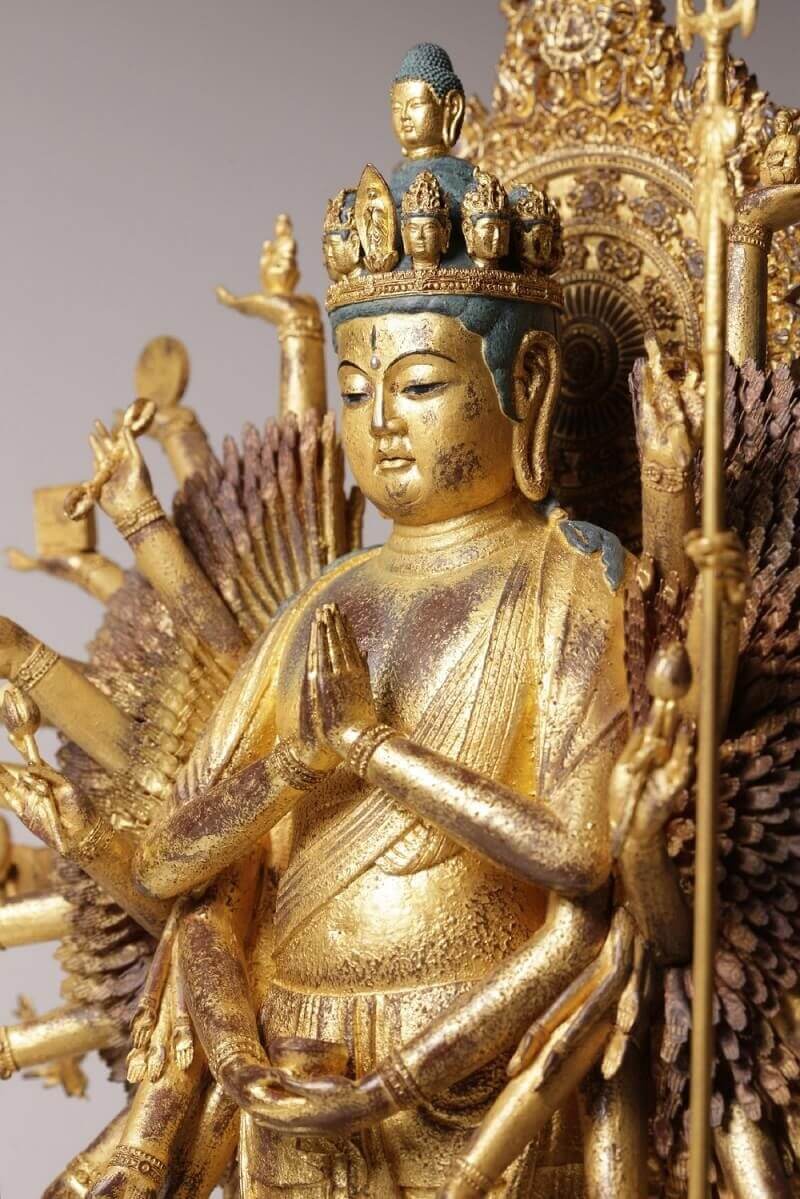This is the second in a series of excerpts about Kyoto taken from the autobiography of Alan Watts, In My Own Way (1972). The passage below comes from the 2001 edition, p.345-6.
*******************

(Photo courtesy Discover Kyoto website owned by Niwaka Corporation)
That day we go down to Sanjusangendo, a long barn of a building which contains one thousand and one images of an astonishing hermaphroditic being known as Kannon, the Watchful Lord, and revered popularly as the Goddess of Compassion. One thousand of these images are life-size standing figures, each with eight arms, lined up along five or six platforms which run the entire length of an inside wall down the center of the building. At mid-point there is the one extra figure, sitting on a lotus throne with eleven heads in a tall column and exactly one thousand arms forming an aureole about the figure. Most of the hands are empty, but at least a hundred of them hold various objects – bells, wands, flowers, thunderbolts, daggers, conch trumpets, flags, books, rosaries, staves, and bottles – instruments which this cosmic millipede is manipulating all at once without having to stop to think about any one of them in particular. It is the same way that my nervous system manages the multitudinous functions of my body, and the energy of working together in an ecological balance of unthinkable complexity. For you cannot truly think of one without thinking of the others, just as the earth implies the sun, and the sun implies the galaxy. To think of one alone is to have your mind caught or hung up on it so that you miss the movement of the whole, and this is what Buddhist mean by ignorance (ignore-ance) and consequent attachment to worldly things. This means any particular thing, such as myself, considered as separate or separable from the rest, and attachment in this sense is almost exactly what we now call a ‘hang-up.’ Spiritual myopia. Not seeing the forest for the trees. Killing flies with DDT and forgetting about the fish and the birds. Thus in passing judgments of praise and blame upon myself I forget that I am like one of Kannon’s hands – a function of the universe. If my conscious mind had eleven hands and one thousand arms I might know what I was talking about. But my conscious mind is but one small operation of my nervous system.
When the rains stopped, Jano and I took a day off for meditation at Nanzenji, not in the temple itself, but on the forested hillside behind it, where we sat on the steps of some ancient nobleman’s tomb, supplying ourselves with the kit for ceremonial tea and a thermos bottle of hot saké. Zen meditation is a trickily simple affair, for it consists only in watching everything that is happening, including you own thoughts and your breathing, without comment. After a while thinking, or talking to yourself, drops away and you find that there is no ‘yourself’ other than everything which is going on both inside and outside the skin. Your consciousness, your breathing, and your feelings are all the same process as the wind, the trees growing, the insects buzzing, water flowing, and the distant prattle of the city. All this is a single many-featured ‘happening,’ a perpetual now without either past or future, and you are aware of it with the rapt fascination of a child dropping pebbles into a stream. The trick – which cannot be forced – is to be in this state of consciousness all the time, even when you are filling out tax forms or being angry. Experiences move through this consciousness as tracklessly as the reflections of flying birds on water, and , as a Zen poem says –
The bamboo shadows
sweep the stairs,
but raise no dust.
In this state it seemed the whole city of Kyoto – with its thousands of shops and businesses, its streetcars, schools, temples, taxis, crooks, policemen, politicians, monks, geisha-girls, salesmen, firemen, waitresses, fish vendors, students and bulging sumo wrestlers – was no other than the thousand-armed body of Kannon.
***********************
For Part One of this series, please click here.


